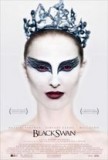| Reviews & Columns |
|
Reviews DVD TV on DVD Blu-ray 4K UHD International DVDs In Theaters Reviews by Studio Video Games Features Collector Series DVDs Easter Egg Database Interviews DVD Talk Radio Feature Articles Columns Anime Talk DVD Savant Horror DVDs The M.O.D. Squad Art House HD Talk Silent DVD
|
DVD Talk Forum |
|
|
| Resources |
|
DVD Price Search Customer Service #'s RCE Info Links |
|
Columns
|
|
|
Black Swan
A veteran of a prestigious ballet company, Nina is geared up for another devoted year on the sidelines when theater director Thomas Leroy (Vincent Cassel) announces that longtime lead dancer Beth (Winona Ryder) is retiring, and that he will be auditioning dancers for the lead in "Swan Lake". Leroy's vision is to have one dancer portray both the tragic, fragile White Swan and the sensuous, wicked Black Swan, but Nina's sheltered upbringing and limited life experience limit her when it comes to the villainous role. With a little perserverance, Nina convinces Leroy to take a chance on her anyway while she works on developing the other half of her performance, but Nina finds herself boxed in by her overbearing, fretful mother (Barbara Hershey), Leroy's disapproval, the shadow of Beth looming over her, and worst of all, the appearance of another dancer named Lily (Mila Kunis), who, in Nina's twisted worldview, threatens to take away everything she's ever dreamed of.
First and foremost, Portman gives a phenomenal, visceral performance that affects the actress down to her very bones. Portman is, of course, a natural beauty, but she makes the emotional strain on Nina physical to the point where it shows in her skin. It's like the actress has been husked, sucked dry of everything except the drive for perfection that defines Nina; what's left is the bare minimum of a human being. As Nina's grasp on reality slips, Portman becomes shakier and shakier, until the viewer worries she's going to shatter. Portman also does a fine bit of dancing; I'm no expert, but the line between Portman and any doubles was sufficiently blurred. Kunis also warrants some praise, although the role isn't that far out of the actress' usual territory (the tone of the film is a more drastic difference than the character she plays); instead, more credit should go to Cassel's commanding performance, which drives the movie along even when he's not present, and Ryder, for one truly chilling sequence.
However, despite Portman's efforts, Black Swan lacks an emotional core. Nina is all about dance, but who is she, and what's left to save? Many have praised Aronofsky for painting a picture of the struggle of the creative process, and that's certainly a valid interpretation, but what else is there to see? Unlike, say, Inception, which envelops a potential metaphor for filmmaking inside a slick, thrilling heist picture, Black Swan has so much subtext, there's no room for surface. In previous films, Aronofsky has crafted characters with dreams and desires, with battered pasts and hopeful presents struggling with naive ideals and impossible situations, but Nina is a blank slate already sliding down a long hill by the time the movie's started, and the character is so passive by nature, it's hard to even muster pity when everything starts to converge on her. A character in (the otherwise unrelated) Donnie Darko is described as "doomed", a key observation that relates to that film's hero, but the difference is that Donnie ultimately feels something about it. Even though Nina ultimately plays as key a role in her own situation as Donnie does in his, she still manages to be in the back seat for it.
A fellow critic defending the movie told me about those he knew who were like Nina, and how accurate the portrayal is. I'm sure that's absolutely true, but as technically authentic as she may be, Nina's not a real person, lacking some key contribution from either Aronofsky or Portman that would allow me to understand and sympathize with Nina as a human being without first-hand experience. Black Swan is a beautifully crafted movie, filled with strong performances, an eye for the art of ballet, and a haunting inevitability that will hang in the air afterward, but it fails to grab hold on the emotional level that resonated so strongly in Aronofsky's other pictures. Unlike Mickey Rourke's Randy the Ram or Ellen Burstyn's Sara Goldfarb, Nina's journey remains distant: it's like it happened to a stranger, like something someone reads in the newspaper. It's sad, but sadder to those who have known her.
Please check out my other DVDTalk DVD, Blu-ray and theatrical reviews and/or follow me on Twitter.
|
| Popular Reviews |
| Sponsored Links |
|
|
| Sponsored Links |
|
|
| Release List | Reviews | Shop | Newsletter | Forum | DVD Giveaways | Blu-Ray | Advertise |
|
Copyright 2024 DVDTalk.com All Rights Reserved. Legal Info, Privacy Policy, Terms of Use,
Manage Preferences,
Your Privacy Choices | |||||||











